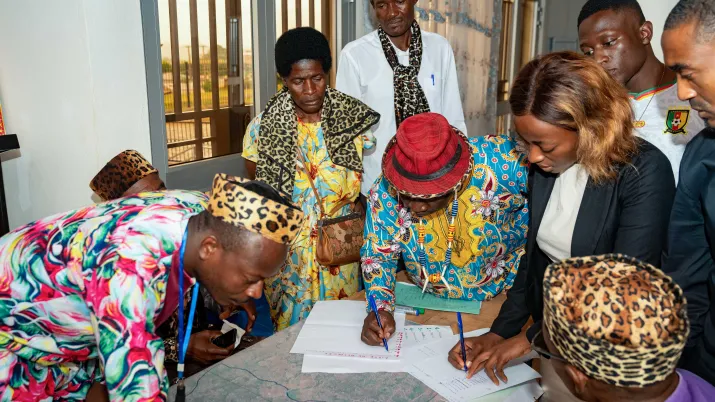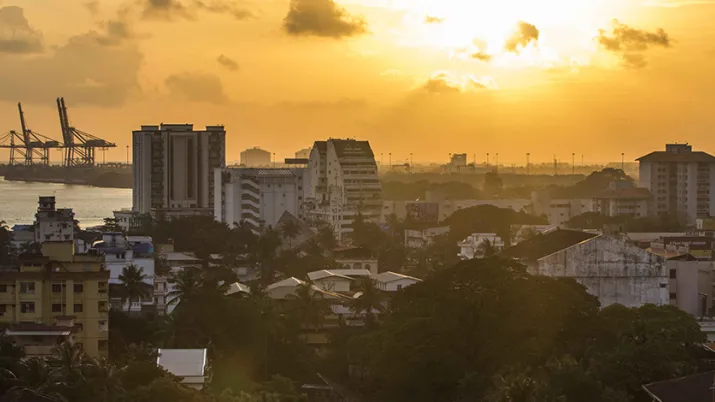Share the page
Our cooperation on smart and sustainable cities
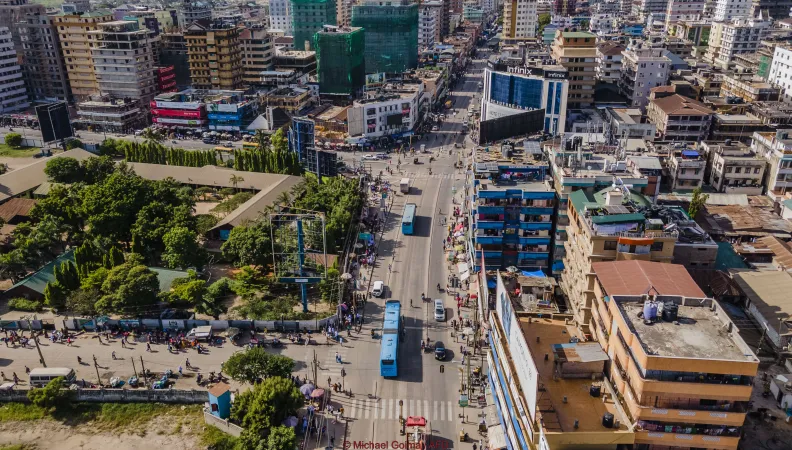
With over half the global population living in urban areas, cities are centres for jobs and services and generate 80% of global GDP.
As cities experience extremely rapid demographic growth – particularly in Africa and Asia – they now present numerous challenges worldwide:
- Accessibility to public services for all
- Uncontrolled urbanisation means a growing number of city dwellers live in underserved neighbourhoods and precarious housing, leading to social exclusion and ghettoisation
- Vulnerability of certain populations to increasingly frequent natural hazards, especially in poorly planned urban areas
- Pollution and environmental impact of human activity in cities
- Climate change requires measures to adapt and reduce urban impact on biodiversity and climate
Through our work as France’s development cooperation agency, we support the transition toward smart and sustainable cities capable of accommodating current and future generations in the best possible conditions.
55% of the world’s population lives in urban areas.
This figure is projected to rise to 70% by 2050. By 2030, 29 more cities will surpass 5 million inhabitants – 15 in Asia and 10 in Africa. Nearly 70% of infrastructure will be built in developing countries in the coming years.
Our strategic priorities
Because cities are the centre of economic activity, they are responsible for over two-thirds of greenhouse gas emissions, and their expansion reduces their potential as carbon sinks. At the same time, the increasing frequency and intensity of climate-related hazards, combined with high population density in often unplanned zones, heightens vulnerability.
Our approach to promoting smart and sustainable cities focuses on three main areas:
- Support the climate transition and urban biodiversity: We support our partner countries and organisations in implementing actions that mitigate and adapt to climate change through resilient urban planning and development as regards density, compactness, functional mix and accessibility. In so doing, we scale up adaptation and decarbonisation measures, which can include nature-based solutions.
- Empower urban stakeholders and inclusive city-making: As the primary mechanism of civic representation and a key stakeholder in urban governance, city authorities often lack adequate human and financial resources, or specific capabilities to fulfil their obligations. We support local authorities and inclusive governance, and ensure that vulnerable and/or marginalised populations are part of city planning, for example by including informal stakeholders in the process.
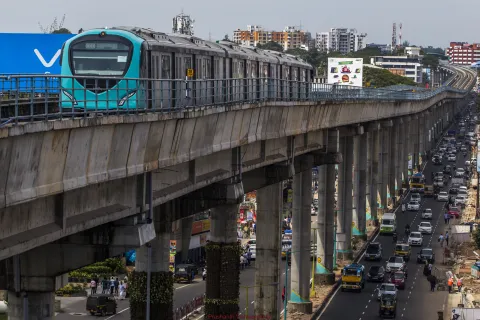 © Prashanth Vishwanathan - AFD
© Prashanth Vishwanathan - AFD
- Reduce geographic, social and gender inequalities: Our projects aim to reduce inequalities within territories by strengthening support to intermediate cities. We prioritise underserved areas to improve access to urban services, create economic opportunities, and reconnect marginalised neighbourhoods with the broader urban fabric. We raise awareness to promote social inclusion through the development of public spaces, dialogue and urban planning. Gender-responsive urban design and equitable access to services are also central to our mission.
Our framework for action
Our work aligns with international commitments such as Sustainable Development Goal (SDG) 11, which seeks to “make cities and human settlements inclusive, safe, resilient and sustainable”, and with the Paris Agreement, which affirms the central role of cities in climate action and adaptation.
Our work also aligns with the New Urban Agenda (adopted during the Habitat III Conference in 2016). This aims to transform cities and human settlements into more inclusive, safe, resilient and sustainable spaces. It reaffirms the four key pillars of sustainable urban development – social, economic, environmental and spatial – and defines priority actions to reach this goal.
Lastly, we adhere to the Kunming-Montreal Global Biodiversity Framework, adopted in 2022 during COP 15 on Biodiversity, which promotes urban biodiversity restoration by improving green urban spaces and green mobility.
Our services in this area
Our services to promote smart and sustainable cities are structured around five key pillars:
- Strengthen urban stakeholder capacity: We advise local authorities on defining strategic orientations and prioritising investments. We also help to strengthen their capacities through training, methodological guidelines, and participatory events, including webinars, workshops, peer-to-peer learning and knowledge sharing. We also help develop urban data collection and analysis systems (GIS, local databases) for stronger urban public policies.
- Support sustainable urban planning: We assist local authorities to update urban planning regulations and enforce urban development controls through building permits, environmental and social management plans, management systems, etc. We help draft and revise urban planning documents that integrate environmental concerns while fostering community involvement.
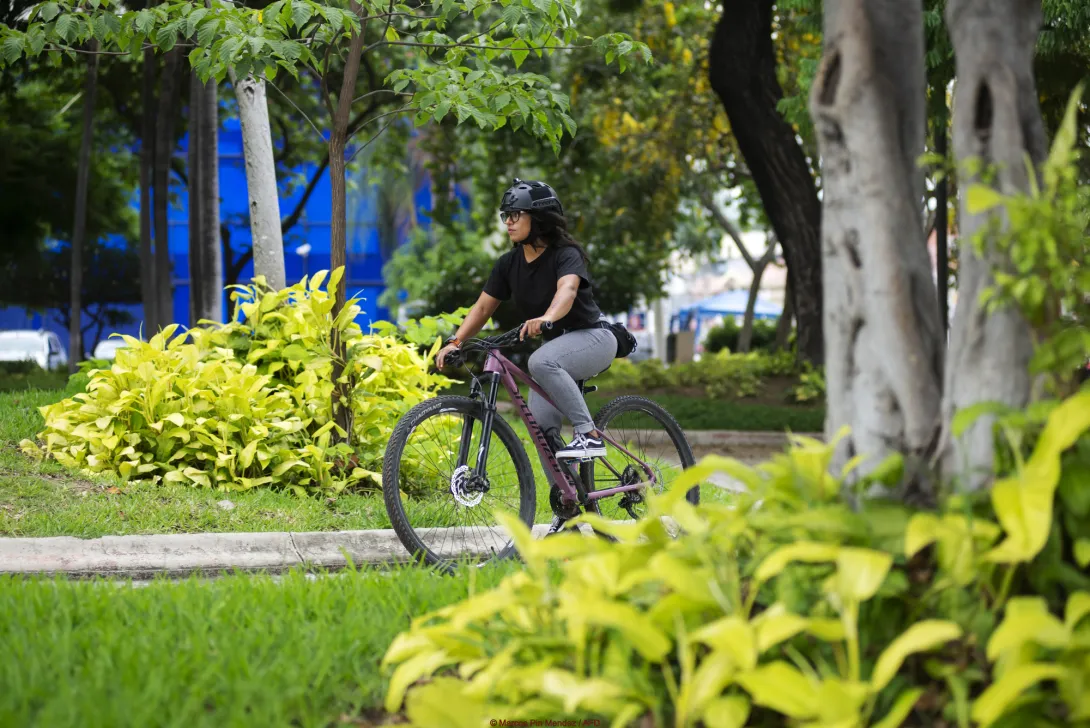
- Promote resilient urban development and equal service access: We assist local authorities and operators to develop urban services and infrastructure through planning, investment, and nature-based, resilient, ecological design. Our support includes targeted training and tools to facilitate the management and use of infrastructure. This lengthens the useful lifespan of infrastructure. It also improves access to urban services for vulnerable populations through service use analysis, pricing policies, and other mechanisms.
- Improve waste management: Our agency supports cities and local authorities in reinforcing all stakeholders involved in the solid waste management chain, from production, pre-collection and collection to transport, treatment and recovery. The goal is to expand access to quality waste services for all.
- Promote sustainable mobility: We support authorities in designing sustainable urban mobility strategies aligned with broader urban policies, such as low-emission zones and pedestrian city centres. We promote public transport, modern ticketing systems, intermodal networks, and active mobility services to promote sustainable transport.
FAQs
For more on smart and sustainable cities
A sustainable city is an urban space that meets current residents’ needs without compromising those of future generations. A smart and sustainable city is environmentally designed, inclusive, climate-resilient and supports biodiversity preservation.
High-quality, accessible urban services are essential for a city to be sustainable and inclusive.
Urban planning is a key springboard for sustainable territorial development. It helps organise spaces to meet the growing needs of inhabitants and develop accessible urban services, while minimising environmental impact. Successful urban planning:
- Reduces greenhouse gas emissions by avoiding urban sprawl and promoting sustainable transport
- Enhances equitable access to water, sanitation, green and public spaces, and commercial infrastructure
- Preserves nature and enhances climate resilience
Urban planning goes hand in hand with building more sustainable cities. This is evident in our projects around the planning and development of infrastructure for urban services.
To improve their adaptability to climate change, cities must implement innovative urban projects using ecosystem-based solutions like green infrastructure, permeability and circularity. They must also harness the principles of ecological urbanism, including clean air, the use of green construction materials and development of blue-green infrastructure.
This also implies carrying out risk mapping to inform urban planning documents. In this way, cities can protect their inhabitants, reduce material damage, and adapt to a constantly changing environment.
Expertise France’s projects are examples of sustainable city development. They include:
- Urbayiti in Haiti: urban governance and population resilience
- Sustainable Cities in Ghana: urban think tank, access to services, waste management
- Urban Platform in Cameroon: national coordination and urban data access (including inclusion and resilience challenges)
- GEDEC in Togo: solid waste and sanitation services
- REGUL in the Democratic Republic of the Congo: urban planning and governance in Kolwezi
A smart and sustainable city is one that presents the following components:
- Balanced urban planning (social mix, density, ecological urbanism)
- Participatory and inclusive governance
- Equitable access to essential services (water, sanitation, mobility, waste)
- Biodiversity protection and climate adaptation
- Circular economy and pollution reduction
Sustainable Development Goal 11 (SDG 11) relates to cities, and aims to “make cities and human settlements inclusive, safe, resilient and sustainable.”
Other SDGs are also linked to cities:
- SDG 6: clean water and sanitation
- SDG 7: affordable, clean energy
- SDG 9: innovation for sustainable city development
- SDG 10: reduce inequalities
- SDG 13: measures against climate change
- Build capacity in local authorities for planning and service delivery
- Co-create urban policies through inclusive civic participation
- Integrate climate risk into urban planning
- Invest in resilient, inclusive, low-carbon infrastructure
- Support innovation in sustainable transport, waste management and housing
Our projects
Air Quality Improvement Program in ASEAN
Ongoing
2023 - 2025
Funders : Agence Française de Développement
Key figures
- 10 countries received support through our projects on sustainable urbanisation and access to urban services
- €39 million in projects

